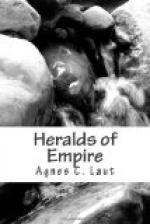Behind peered Eli Kirke, pale with fear, his eyes asking mine if I knew. True as eyes can speak, mine told him that I knew as well as he.
“Body o’ me! What-a-deuce? Only a little fighting sparrow of a royalist!” cried a swaggering colt of a fellow in officer’s uniform.
“No one here, lad?” demanded a second.
And I saw Eli Kirke close his eyes as in prayer.
“Sir,” said I, drawing myself up on my heels, “I don’t understand you. I—am here.”
They bellowed a laugh and were tumbling over one another in their haste up the attic stairs. Then my blood went cold with fear, for the memory of that poor old man going to the shambles of London flashed back.
A window lifted and fell in the attic gable. With a rush I had slammed the door and was craning out full length from the window-sill. Against the lattice timber-work of the plastered wall below the attic window clung a figure in Geneva cloak, with portmanteau under arm. It was the man who had supped so late with Eli Kirke.
“Sir,” I whispered, fearing to startle him from perilous footing, “let me hold your portmanteau. Jump to the slant roof below.”
For a second his face went ashy, but he tossed me the bag, gained the shed roof at a leap, snatched back the case, and with a “Lord bless thee, child!” was down and away.
The spurred boots of the searchers clanked on the stairs. A blowing of horns! They were all to horse and off as fast as the hounds coursed away. The deep, far baying of the dogs, now loud, now low, as the trail ran away or the wind blew clear, told where the chase led inland. If the fugitive but hid till the dogs passed he was safe enough; but of a sudden came the hoarse, furious barkings that signal hot scent.
What had happened was plain.
The poor wretch had crossed the road and given the hounds clew. The baying came nearer. He had discovered his mistake and was trying to regain the house.
Balaam stood saddled to carry Eli Kirke to the docks. ’Twas a wan hope, but in a twinkling I was riding like wind for the barking behind the hill. A white-faced man broke from the brush at crazy pace.
“God ha’ mercy, sir,” I cried, leaping off; “to horse and away! Ride up the brook bed to throw the hounds off.”
I saw him in saddle, struck Balaam’s flank a blow that set pace for a gallop, turned, and—for a second time that day was lifted from the ground.
“Pardieu! Clean done!” says a low voice. “’Tis a pretty trick!”
And I felt myself set up before a rider.
“To save thee from the hounds,” says the voice.
Scarce knowing whether I dreamed, I looked over my shoulder to see one who was neither royalist nor Puritan—a thin, swarth man, tall and straight as an Indian, bare-shaven and scarred from war, with long, wiry hair and black eyes full of sparks.
The pack came on in a whirl to lose scent at the stream, and my rescuer headed our horse away from the rabble, doffing his beaver familiarly to the officers galloping past.




